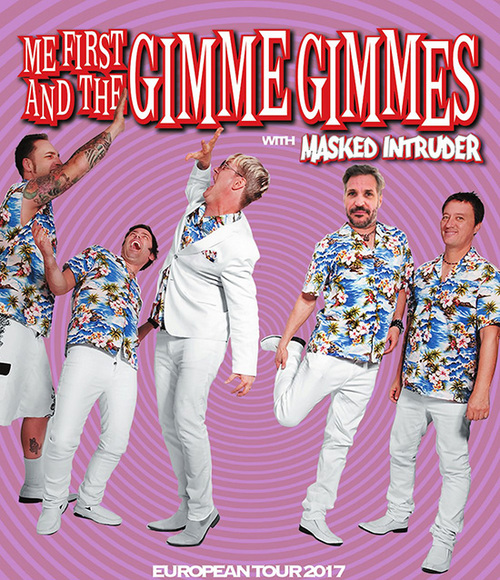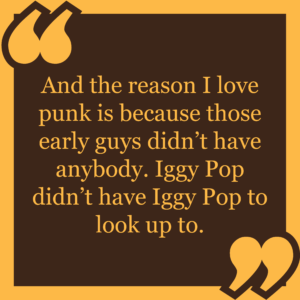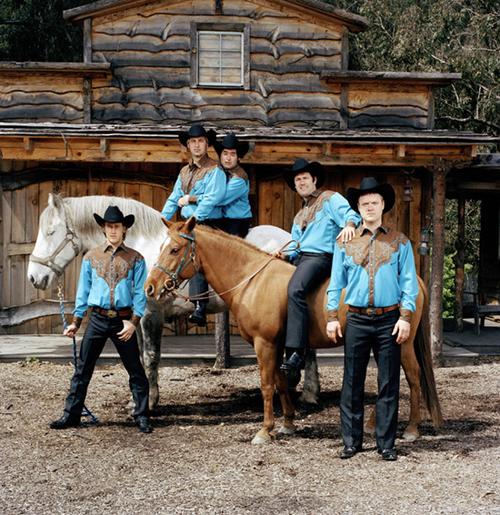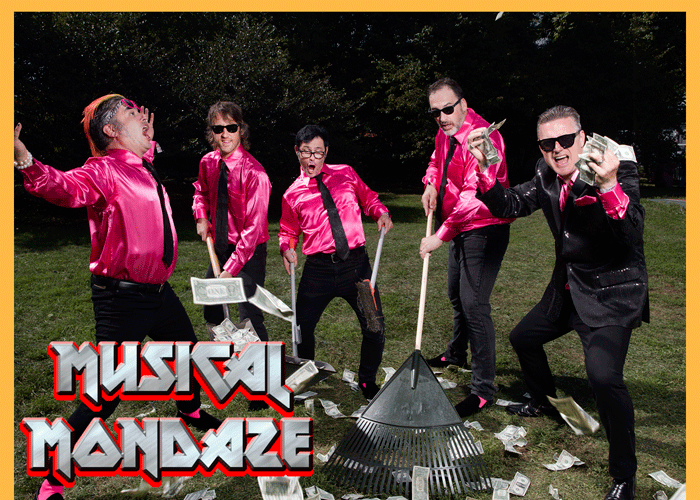It’s Monday and that means Musical Mondaze.

This time out we’re down with Spike Slawson, lead singer of the punk supergroup Me First and the Gimme Gimmes. Slawson, former bass player for the Swingin’ Utters and current frontman for The Re-Volts, started up with the tongue-in-cheek cover band in 1995. Since then, he has belted out a record collection’s worth of punk versions of very un-punk classics like “Over the Rainbow,” “Uptown Girl,” and “End of the Road.” The band’s latest album, “Rake It In: The Greatestest Hits” is available now.
We recently sat down with Slawson to discuss what keeps the band together, how performing covers can still lead to creative conflict, and the current state of punk.
TrunkSpace: You guys have been performing as Me First and the Gimme Gimmes since 1995. What is it that keeps you guys going?
Slawson: The good times… rolling.
TrunkSpace: It does seem like, as far as bands go, this would be one that is consistently fun.
Slawson: Yeah. It has its moments. It certainly has its moments. When your heart and soul and blood and sweat and tears are not in it, that leaves a lot of room for casual, lighthearted fun.
TrunkSpace: Does it make it less stressful as far as the band atmosphere because you’re not necessarily creating from scratch, but adapting what has already been created?
Slawson: Yeah, but when you’re dealing with musicians, they create tension where there is none. I think people should be required to do a year of compulsory, I don’t know, food service. Not military, but just one of those shitty jobs so they won’t forget it.
Like, you would think, theoretically, just doing covers, all you have to worry about is arrangements and blocking out some time on your schedule, but we always find a way to make things difficult.
TrunkSpace: When it comes to the live shows, it must make it a fun sort of singalong party atmosphere because of the fact that you’re playing songs that most people are already familiar with?
Slawson: Absolutely. Yeah. I try, like I said, to deliver the tension in a live scenario and make people feel, at least somewhat, awkward and uncomfortable because I feel that’s my job as a master of ceremonies to bring up things that make people feel…
Awkward and uncomfortable.
I guess I already said it. I finished my thought. I’m sorry. My mouth kept going.
TrunkSpace: And what’s probably nice with that is, when you do introduce new material into your catalog of tunes, again, because people already know them, even the new stuff gets a reaction.
Slawson: Yeah. I would think that they do. It’s easier for them to enjoy and easier for us to do.
This music seems like it’s for something different than it was in the 70s. Like, if you’re trying to wake people up to facts… or uncomfortable facts, alternative facts… there’s already so much information and stimuli in that regard that it seems like your job, even as a punk band… a so-called punk band, whether you believe one of those could still exist in 2017… even as a punk cover band your job is just to show people a good time.
TrunkSpace: Do you think bands are saying more these days than they have in recent years? Are they taking political and social stances?
Slawson: Yeah, but punk has sort of become an echo chamber. It’s like, on the one hand it’s like an echo chamber of preaching to the choir and then on the other hand it’s just sort of like a notch in the mainstream dial. I don’t know that punk is necessarily the medium that you’re going to hear the kind of radical thought and expression that actually changes people’s minds… that actually changes a lot of people’s minds the way it seems like it did in the 70s.
TrunkSpace: So is there another genre or platform that has stepped up and taken over that role?
Slawson: Well, what I think is that there was a dearth of information before. Or that information was more tightly controlled and brought to you by fewer sources. And now that there’s a big competitive market that brings information, and “information” as well, I think that what we would like to provide is a break from all of that information. Just because you put it to music, doesn’t make it anymore relevant. I think people know what’s going on in the world.
TrunkSpace: It almost feels like people know too much because they’re inundated with that information and then it’s hard to shut it off and just escape.
Slawson: Yeah, and they’re sort of paralyzed. So I don’t know that punk, in specific, or music at large is any place to sort of address it. I think it is what it always was, which is the soundtrack that people listen to while they come up with their own solution. To me, punk is just sort of this expression of, “This is who I am. I was born weird and now I wear what used to feel like flaws as armor.” But I don’t know that any political ideology attached to it has any relevance in our current context.
people listen to while they come up with their own solution. To me, punk is just sort of this expression of, “This is who I am. I was born weird and now I wear what used to feel like flaws as armor.” But I don’t know that any political ideology attached to it has any relevance in our current context.
I heard that 200 people went to a rave in a sewer. And that sounded kind of punk to me, even though I hate the music. Just by nature, it seems like kind of a cool, weird expression of people that wanted to have fun and they couldn’t go anywhere but a fucking sewer.
TrunkSpace: You’ve been at music professionally now for a few decades. Have you seen the crowds age with you or are you still drawing younger crowds of kids who are trying to figure out the scene themselves and trying to find punk.
Slawson: A little bit of both. It’s not so hard to find anymore. And when it was hard to find, it’s why people were so protective of it. It’s why these sort of elder statesman in any local scene kind of made the kids feel really green because it took them… they had to go to the shitty part of town to find weird comic books or weird records or go to weird shows and nobody held their hand and did it for them. They were just born weird and went to go find it. It wasn’t really a choice for them where it’s sort of more of a choice now.
TrunkSpace: It was like when you’d have to go meet some sketchy guy who peddled illegal bootlegs just to get some new music of your favorite bands.
Slawson: Yeah. And what does illegal bootleg even mean anymore?
TrunkSpace: Exactly.
Slawson: I don’t know though. Hip-hop kind of had that feeling to me in the late 80s and throughout much of the 90s, as sort of this revolutionary musical movement. It was definitely, at least partially, political, but most of it to me had to do with, like, “This is who I am… society’s pariah, but I’m proud of it and fuck you!” “This is my music. This is my scene. Go fuck yourself.” That was my takeaway from that and that to me, whether the music was different or not… like I know you’re not allowed to call hip-hop punk, but I don’t fucking care. The differences are not really that interesting to me.
And the reason I love punk is because those early guys didn’t have anybody. Iggy Pop didn’t have Iggy Pop to look up to. Like, he dug The Kinks apparently and there were all sorts of other musical cues that he took, but as far as his persona and who he was going to be, he didn’t have any him as an example. And he’s the only one who didn’t. Those early punk bands with their sort of sense of style and that weird knack for outrageous behavior and statements and kind of image propulsion… they didn’t have anybody else as an example either. They were creating something almost out of a vacuum. Just by definition, that doesn’t happen with punk. All it does is turn into this like, sort of weird emo thing… this weird entitled, white people feeling sorry for themselves. And that’s not a good look either.

April 6, 2006
© Jay Blakesberg
TrunkSpace: Nowadays everything has a sub-genre as well. Nothing just is anymore. It needs to be broken down and defined to the most miniscule sound.
Slawson: Yeah. I’m not going to say it speaks to the wrong person because I think that’s elitist and exclusive, but I think it should guide them in other directions. Like, you have nothing to feel sorry for yourself for. That’s where I find there’s this weird kind of self-indulgent, white middle-class thing that I really dislike and that has come to sort of define punk to me… rather than any politics or revolutionary spirit. Punk in this day and age to me has come to mean middle-class white kids.
TrunkSpace: Whenever something shows the ability to turn a profit, that’s usually where it tends to become a little muddied.
Slawson: Yeah, but then my issue with that is, why didn’t it end it? Usually that smells the death of it and I’m still waiting.
Maybe that speaks to the resilience of punk music and punk culture that I’m not seeing or acknowledging. I guess you don’t think of heavy metal as being political music, but it energizes people. It makes them feel brave when they’re going to go out on the streets and face people that are going to fuck with them for looking a certain way. That’s what that really hyper-masculine hardcore music did for me when I was a kid. I understand it’s appeal just musically and it’s fast and all of that sort of stuff, but I question sometimes where it takes people. And I think sometimes that’s not the band’s problem. They don’t consider that they’re… I don’t know.
The fact that it was co-opted by the mainstream means that it should have died some time ago, to me, and turned into something else.
Me First and the Gimme Gimmes are currently on tour. Find dates here.


